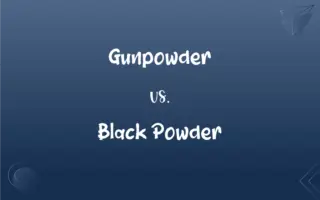Potassium Iodide vs. Potassium Iodate: What's the Difference?
Edited by Harlon Moss || By Janet White || Published on October 23, 2024
Potassium iodide is an inorganic compound used in medical treatments and as a nutritional supplement, while potassium iodate is an oxidizing agent used in iodizing salt and as a dough conditioner.

Key Differences
Potassium iodide (KI) is a stable salt commonly used in medical applications, particularly as a treatment for thyroid conditions and as a protective agent against radioactive iodine. Potassium iodate (KIO₃), on the other hand, is an oxidizing agent and is often used to iodize table salt to prevent iodine deficiency disorders.
In terms of chemical structure, potassium iodide is composed of potassium ions and iodide ions, making it a simple ionic compound. Potassium iodate contains potassium ions and iodate ions, where the iodine atom is bonded to three oxygen atoms, making it a more complex molecule.
Potassium iodide finds its use in photography for film development and as a fluorescence quenching agent in biomedical research. Potassium iodate serves a critical role in the baking industry as a dough conditioner, improving the texture and volume of bread.
The safety profile of potassium iodide allows for its use in various concentrations in medicine and dietary supplements, with minimal side effects at recommended doses. Potassium iodate, due to its oxidizing properties, requires careful handling and is regulated in food applications to ensure consumer safety.
While potassium iodide is directly involved in thyroid health by providing iodine, an essential nutrient for thyroid hormone production, potassium iodate needs to be reduced to iodide in the body before it can be utilized by the thyroid gland, showcasing a key difference in their biological utilization.
ADVERTISEMENT
Comparison Chart
Chemical Composition
Composed of potassium ions and iodide ions
Composed of potassium ions and iodate ions
Primary Use
Medical treatments, nutritional supplements
Iodizing salt, dough conditioner
Chemical Structure
Simple ionic compound
Contains iodine bonded to three oxygen atoms
Applications in Industry
Photography, biomedical research
Baking industry
Safety and Handling
Generally safe with minimal side effects at recommended doses
Requires careful handling due to oxidizing properties
ADVERTISEMENT
Potassium Iodide and Potassium Iodate Definitions
Potassium Iodide
Utilized in medical treatments for thyroid conditions.
The doctor prescribed potassium iodide to treat her hyperthyroidism.
Potassium Iodate
Involved in emergency preparedness for nuclear accidents.
Potassium iodate can also be used as a protective agent against radioactive iodine exposure.
Potassium Iodide
Used in film development in photography.
He added potassium iodide to the developer solution to enhance the image quality.
Potassium Iodate
An oxidizing agent used in iodizing table salt.
Potassium iodate ensures the adequate iodine content in table salt for thyroid health.
Potassium Iodide
Employed as a fluorescence quenching agent in research.
Potassium iodide was used in the lab experiment to reduce fluorescence interference.
Potassium Iodate
Requires careful handling due to its oxidizing properties.
Potassium iodate is stored separately in the lab to prevent reactions with other chemicals.
Potassium Iodide
Acts as a nutritional supplement for iodine.
Potassium iodide is added to table salt to prevent iodine deficiency.
Potassium Iodate
Serves as a dough conditioner in baking.
The baker used potassium iodate to improve the bread's texture and volume.
Potassium Iodide
A compound used as a thyroid protection agent.
Potassium iodide tablets were distributed to prevent thyroid cancer after the nuclear accident.
Potassium Iodate
Used to prevent iodine deficiency disorders.
Countries with iodine-deficient soils add potassium iodate to salt to combat health issues.
FAQs
What are the main uses of potassium iodide?
It's used to protect the thyroid from radioactive iodine, treat thyroid conditions, and as a nutritional supplement.
How is potassium iodide administered?
It's available in tablet form or liquid solution for oral intake.
What is potassium iodide?
Potassium iodide is a salt of stable iodine, used as a medication and dietary supplement.
What are the side effects of potassium iodide?
Side effects can include gastrointestinal upset, allergic reactions, and thyroid dysfunction with prolonged use.
How long does potassium iodide protect against radiation?
Protection lasts approximately 24 hours, so it may need to be taken daily in a radiation exposure scenario.
Is potassium iodate safe as a dietary supplement?
While effective for iodine supplementation, its use is more regulated due to its oxidizing properties.
How does potassium iodide work for radiation protection?
It saturates the thyroid with stable iodine, preventing absorption of radioactive iodine.
Is potassium iodide safe for everyone?
While generally safe, it's not recommended for people with certain allergies or thyroid conditions without medical advice.
Is potassium iodide effective against all forms of radiation?
No, it only protects against radioactive iodine, not other radioactive materials.
How is potassium iodate used?
It's used for thyroid protection, as a bread improver, and in emergency radiation treatment.
How is potassium iodate administered?
It's typically provided in tablet form for emergency use or added to salt and bread in small amounts.
Why is potassium iodate added to bread?
It's used as a dough conditioner and to fortify bread with iodine.
Can potassium iodide be used in food processing?
Yes, it's used as a stabilizer or to fortify foods with iodine.
Can pregnant women take potassium iodide?
Yes, but under medical supervision to avoid thyroid problems in the fetus.
What are the differences between potassium iodide and potassium iodate?
The main difference is in their chemical properties; iodate is a stronger oxidizer and less stable in storage than iodide.
Can potassium iodate protect against radiation?
Yes, it serves a similar purpose as potassium iodide by blocking radioactive iodine from the thyroid.
Can potassium iodate be used for water purification?
Yes, in small amounts, it can be used to disinfect water, although it's not the most common method.
Are there any environmental concerns with potassium iodate?
As a strong oxidizer, it needs careful handling and disposal to prevent environmental damage.
What are the side effects of potassium iodate?
Similar to potassium iodide, including gastrointestinal issues and potential thyroid dysfunction with excessive use.
What is potassium iodate?
Potassium iodate is an iodine compound used similarly to potassium iodide but is a stronger oxidizing agent.
About Author
Written by
Janet WhiteJanet White has been an esteemed writer and blogger for Difference Wiki. Holding a Master's degree in Science and Medical Journalism from the prestigious Boston University, she has consistently demonstrated her expertise and passion for her field. When she's not immersed in her work, Janet relishes her time exercising, delving into a good book, and cherishing moments with friends and family.
Edited by
Harlon MossHarlon is a seasoned quality moderator and accomplished content writer for Difference Wiki. An alumnus of the prestigious University of California, he earned his degree in Computer Science. Leveraging his academic background, Harlon brings a meticulous and informed perspective to his work, ensuring content accuracy and excellence.






























































